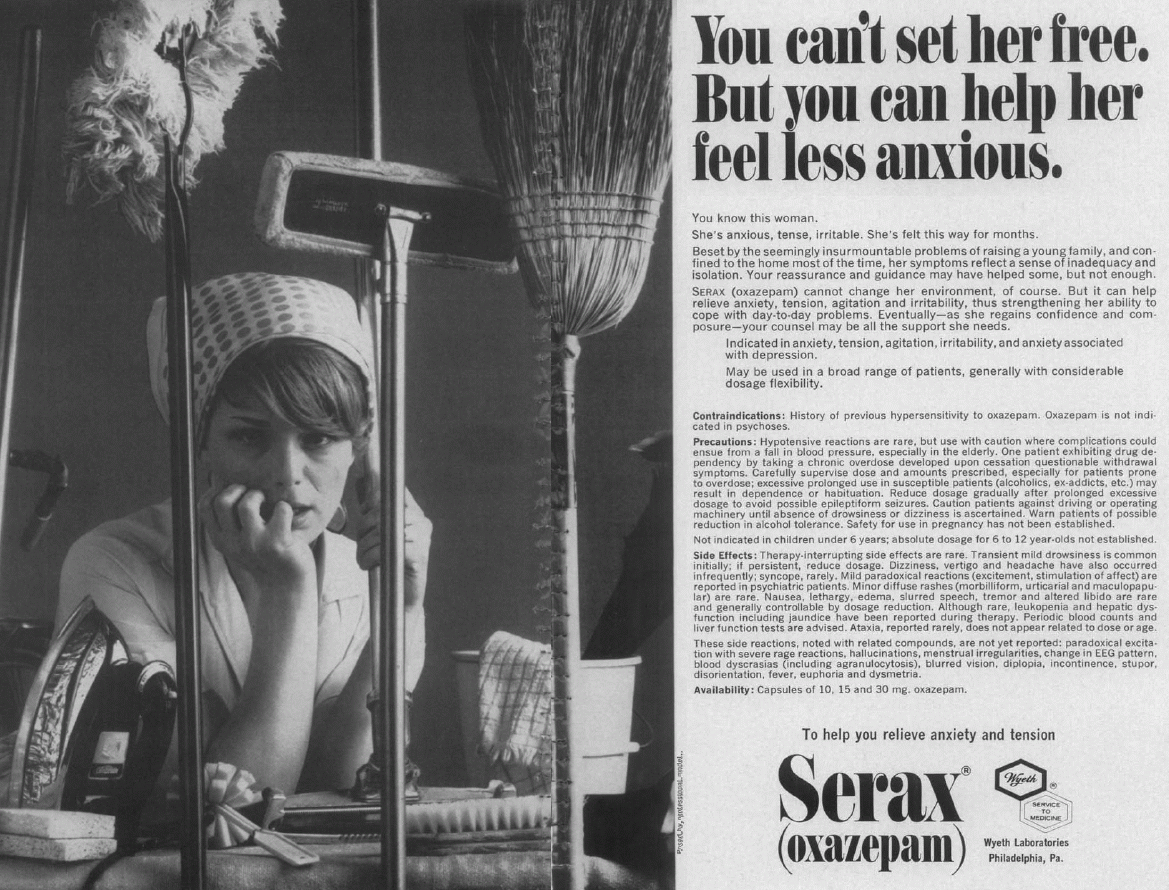

|
|
Serax advertisement, 1967. JAMA: The Journal of the American Medical Association, Vol. 200, No. 8, pp. 206-207. You can't set her free. But you can help her feel less anxious. You know this woman. She's anxious, tense, irritable. She's felt this way for months. Beset by the seemingly insurmountable problems of raising a young family, and confined to the home most of the time, her symptoms reflect a sense of inadequacy and isolation. Your reassurance and guidance may have helped some, but not enough. Serax (oxazepam) cannot change her environment, of course. But it can help relieve anxiety, tension, agitation and irritability, thus strengthening her ability to cope with day-to-day problems. Eventually -- as she regains confidence and composure -- your counsel may be all the support she needs. Indicated in anxiety, tension, agitation, irritability, and anxiety associated with depression. May be used in a broad range of patients, generally with considerable dosage flexibility. Contraindications: History of previous hypersensitivity to oxazepam. Oxazepam is not indicated in psychosis. Precautions: Hypotensive reactions are rare, but use with caution where complications could ensue from a fall in blood pressure, especially in the elderly. One patient exhibiting drug dependency by taking a chronic overdose developed upon cessation questionable withdrawal symptoms. Carefully supervise dose and amounts prescribed, especially for patients prone to overdose; excessive prolonged use in susceptible patients (alcoholics, ex-addicts, etc.) may result in dependence or habituation. Reduce dosage gradually after prolonged excessive dosage to avoid possible epileptiform seizures. Caution patients against driving or operating machinery until absence of drowsiness or dizziness is ascertained. Warn patients of possible reduction in alcohol tolerance. Safety for use in pregnancy has not been established. Not indicated in children under 6 years; absolute dosage for 6 to 12 year-olds not established. Side effects: Therapy-interrupting side effects are rare. Transient mild drowsiness is common initially; if persistent, reduce dosage. Dizziness, vertigo and headache have also occurred infrequently; syncope, rarely. Mild paradoxical reactions (excitement, stimulation of affect) are reported in psychiatric patients. Minor diffuse rashes (morbiliform, urticarial and maculopapular) are rare. Nausea, lethargy, edema, slurred speech, tremor and altered libido are rare and generally controllable by dosage reduction. Although rare, leukopenia and hepatic dysfunction including jaundice have been reported during therapy. Periodic blood counts and liver function tests are advised. Ataxia, reported rarely, does not appear related to dose or age. These side reactions, noted with related compounds, are not yet reported: paradoxical excitation with severe rage reactions, hallucinations, menstrual irregularities, change in EEG pattern, blood dyscrasias (including agranulocytosis), blurred vision, diplopia, incontinence, stupor, disorientation, fever, euphoria and dysmetria. Availability: Capsules of 10, 15 and 30 mg. oxazepam. To help you relieve anxiety and tension SERAX® (oxazepam) ~ Service to Medicine ~ Wyeth Laboratories Philadelphia, Pa. |